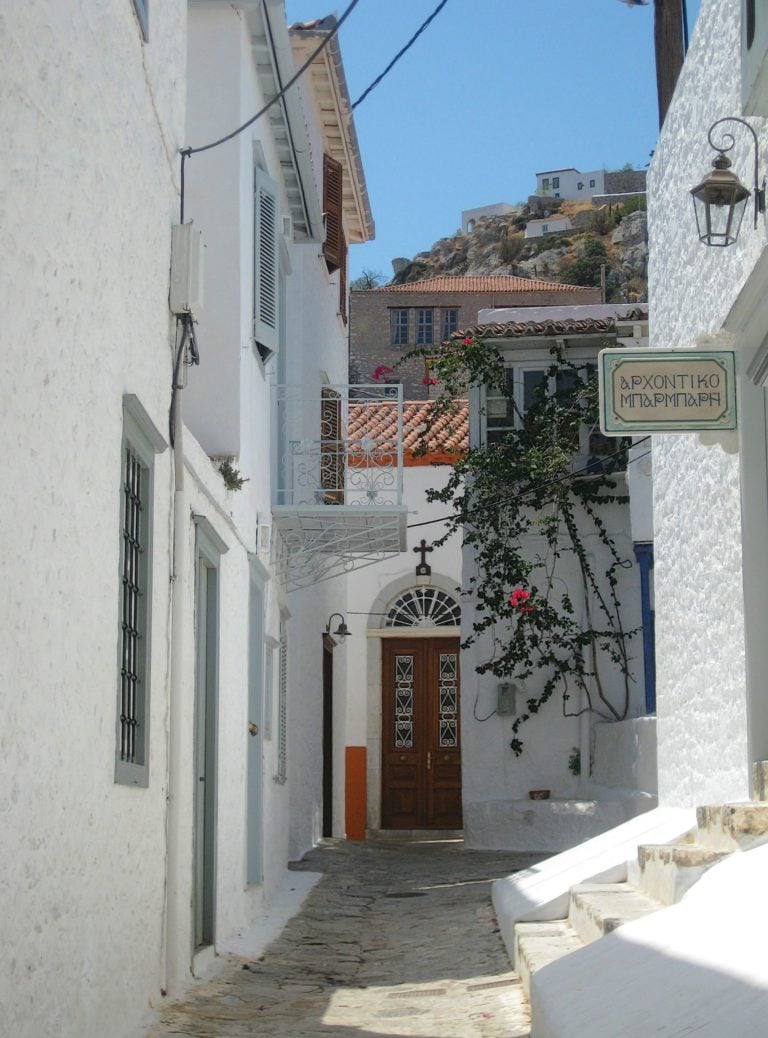We Hydriots are a proud, yet prickly, people. Our island is rough hewn and to a degree, so are we, though our hearts are big and our minds quick.
I am proud Hydriot-American, and I remember with general fondness the years that we owned a lovely house there, bought in 1977 and restored at great cost and stress by my parents. Those of you who know the travails of Greek bureaucracy and renovation projects need little explanation.
Then, there was our neighbour, the diminutive Kyria E. Proud and prickly, a force of nature, she lived in a more modest house to the left of ours and slightly downhill from us (Hydra is a vertically built amphitheater). Our homes connected—in fact there was an (illegal) window opening on to our terrace—and no doubt our terrace became their terrace in our absence. In front of both houses there was a road originally about three meters wide, going down steps towards the town and port. This was one of two routes, and the faster one, down to the town.
On municipal land next to the road, Kyria E set up a chicken coop. This was illegal, and my father probably suspected that this was a step towards establishing ownership. In our confrontations, Kyria E went from anger to kindness, to comments about America (de rigeur in 1980s Greece), to plying us with fresh (and delicious) eggs, but eventually she removed the chicken coop.
The next summer, it was back. According to my aunt, who visited regularly from Athens, the chicken coop “returned” within a few days of our departure to America. I remember arriving the next summer on the island, in the middle of a scorching siesta, laden with luggage and jetlagged, to a shouting match over the chicken coop. In addition to the chicken coop, a vine laden pergola extended over our heads and part of the road.
The next day, my father was at the Municipal Offices, going through the official channels to force a change. The usual litany of “come tomorrow,” or “so and so is not here,” et constant cetera. Though my father was a Greek citizen, we lived abroad, and he could not vote, and Kyria E was head of a household with four voters, in a town with a permanent population of 2,500. The outcome was never in doubt.
A year or so later, the pergola became an extra, or expanded, room. Kyria E’s son, like many of the locals back in the 1980s, was a skilled builder (locals don’t build much anymore, Albanians do the work, and Hydriots have resurrected the Arvanitika of their grandparents to communicate), and the next year a perfectly whitewashed addition had increased the house by about 20 percent, while reducing the road’s width by about 60 percent.
Fait accompli, a la greque!
To be fair, this is Hydra, so there are no cars, and the one-meter passage was enough for two-footed or four-footed traffic, particularly if one travels single file. And after all, there is another, less convenient road, and the donkey trail, often as not littered with the donkeys’ droppings.
In the early 2000s, a few years before I moved my family to Greece, my parents sold the house. When we lived there, I went by the old house, nostalgically recalling so many summers of memories. My parents had passed, but Kyria E, older than my father by probably a decade, was still there, hale and hearty, and teary eyed to see me. So was I.

This story of “creative” housing expansion has been repeated thousands of times across Greece. To some degree, it is rooted in our history. With so many refugees, wars, and a gnawing poverty, it is understandable that the labyrinthine and grey world of Greek land ownership and rights would develop as it did.
Kyria E’s illegal (and subsequently, post-election legalised) theft of a public byway was a so-called “victimless crime,” and her activity is embedded in the culture. In a poor, Third World, refugee-laden, post-conflict[s] Greece it may have been understandable and necessary. In the Greece of the EU there is simply no excuse. The practice and attitude have enabled or encouraged the burning of forests, undue encroachments on necessary infrastructure, and leads people to treat public property with disdain or as something opportunistic.
Again, it seems like a victimless crime, stealing from the state; when the state was ruled by the Ottomans, it might have even been patriotic, except that we became those Ottomans, and perpetuated their corruption. And the state is our country.
Aside from the fact that the countless Kyria E’s stole from all of us, their actions—more appropriately our collective sins of omission and commission—often do have victims.
Maybe not immediately, maybe decades later.
The road too narrow to drive to escape a fast-moving fire, or flood, or to get your pregnant wife to the hospital. The public beach “appropriated” by barbed wire fencing that prevented an escape route to the sea when the fire came, or the home built over a riverbed and subsequently “legalised.” The one carried away by the flash flood, the flood which was made all the worse by soil erosion from the fires lit decades before, to open the previously forested hillside to development.
All these things were crimes, and they all had victims.








